Web development is one of the most rewarding and fast-growing careers in today’s digital age. Whether you want to become a front-end developer, back-end engineer, or a full-stack pro, mastering certain foundational skills is essential. These are not just technical skills but also creative and strategic capabilities that help you build better, faster, and more user-friendly websites and applications.
In this blog, we’ll explore the top must-have skills every web development student should master in 2025 and beyond to become industry-ready and stand out in the job market.
Looking for the best Web development course in Delhi? Contact TGC India for expert-led training and hands-on projects.
1. HTML & CSS – The Building Blocks
Before anything else, you need to get your basics right. HTML (Hypertext Markup Language) and CSS (Cascading Style Sheets) are the foundational languages of web development.
HTML structures your content: headings, paragraphs, images, links, and lists.
CSS styles that deal with colors, fonts, spacing, and layout.
Without mastering these two, it’s impossible to build anything visually appealing or user-friendly on the web. Every web development journey starts here.
2. JavaScript – Making Things Interactive
JavaScript brings life to web pages. It allows you to build dynamic features such as sliders, pop-ups, real-time updates, and interactive forms.
Students should learn:
JavaScript basics (variables, loops, functions)
DOM manipulation
Event handling
ES6+ syntax
Fetch API and async programming
JavaScript is a core skill that’s essential for both front-end and full-stack development.
3. Responsive Web Design
In 2025, users access websites from a wide variety of devices—smartphones, tablets, laptops, and even smart TVs. Knowing how to make your site look great on all screen sizes is a must.
Learn:
CSS Flexbox and Grid
Media queries
Mobile-first design approach
Cross-browser compatibility
A developer who can build responsive websites is more valuable in today’s mobile-first world.
4. Version Control/Git
Version control tools like Git are essential for tracking changes in your code. Every professional developer uses Git for collaboration and code management.
You should know how to:
Initialize a Git repository
Commit and push changes
Create and merge branches
Use GitHub or GitLab
This also prepares you for collaborative projects and remote work environments.
5. Front-End Frameworks (React, Vue, or Angular)
JavaScript libraries and frameworks make it easier to build large-scale web applications. React, in particular, is extremely popular in 2025.
Understand:
Component-based architecture
JSX (for React)
State and props
Lifecycle methods
Routing and state management libraries like Redux or Context API
Even a beginner portfolio with a React project can impress employers.
6. Back-End Basics (Node.js, Express, Databases)
Even if you plan to specialize in front-end, understanding how the back-end works will make you a better developer.
Learn:
How servers work
Basics of Node.js and Express.js
RESTful APIs
Database integration with MongoDB or MySQL
This knowledge is crucial if you want to become a full-stack developer.
7. Understanding Databases
Web apps need to store and retrieve data efficiently. Knowing how to work with databases is essential.
You should be comfortable with:
CRUD operations (Create, Read, Update, Delete)
SQL (MySQL, PostgreSQL) or NoSQL (MongoDB)
Data modeling and relationships
Indexing and query optimization
Databases form the backbone of user-driven web applications like blogs, e-commerce, and dashboards.
8. Basic UX/UI Design Principles
A good developer understands not just the code but also the user experience.
Learn to:
Design intuitive user flows
Choose effective typography and color schemes
Optimize page speed and usability
Use design tools like Figma or Adobe XD
Having design sense helps you collaborate better with designers and build more user-centric websites.
9. Problem-Solving and Debugging
Web development is filled with bugs and unexpected behaviors. Problem-solving is a key skill that sets good developers apart from great ones.
Develop your ability to:
Use browser dev tools
Read error messages
Search documentation effectively
Break down complex problems into smaller parts
Practice through platforms like LeetCode, HackerRank, or by building projects.
10. Soft Skills and Communication
Technical skills will get you in the door, but communication, teamwork, and professionalism will help you grow and lead.
Work on:
Clear written and verbal communication
Explaining your code to non-tech stakeholders
Collaborating with designers, marketers, and other developers
Managing your time and meeting deadlines
These skills are crucial when working on team projects or freelancing.
11. Building and Hosting Projects
It’s important to not only build projects but also deploy them online.
Learn how to:
Use GitHub Pages, Netlify, or Vercel
Set up hosting with services like Heroku or Render
Purchase domains and configure DNS
Understand deployment pipelines
A live project portfolio gives recruiters confidence in your practical skills.
12. Continuous Learning and Curiosity
Web development changes quickly. New frameworks, libraries, and best practices emerge every year. Cultivate the habit of learning.
Stay updated by:
Following blogs and YouTube channels
Taking new online courses
Reading official documentation
Attending webinars or meetups
A developer with curiosity and adaptability is always in demand.
Boost your career with a professional Graphic Design course in Delhi at TGC. Contact us today to get started with hands-on training and real-world projects!
Final Thoughts
Mastering web development isn’t just about learning a few languages—it’s about developing a problem-solving mindset, keeping up with trends, and building real-world projects. By focusing on these must-have skills, web development students can become job-ready, stand out from the competition, and build meaningful digital experiences.
So, whether you’re just starting or looking to refine your toolkit, keep learning, keep coding, and build things that make the web a better place.






